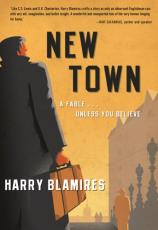Reading Group Guide
Discussion Questions
New Town: A Fable

1. What basic gap in thinking between Bernard and Dr. Fisher makes their first meeting awkward?
2. In their second meeting, what is it in Bernard's attitude that draws out Dr. Fisher's sympathetic help?
3. What aspects of the collapsing fabric of Old Hertham or Old Town (OT) seem most like aspects of earthly life?
4. What real-life attitudes does Blamires mock in the representation of the conservationists, Professor Simpkins, Len Bollinge and the meeting of the Old Hertham Preservation Trust?
5. What additional meaning is conveyed in the author's choice of names such as Old Town (OT) and New Town (NT), Eve, Paradise Green, the Adamses' garden, Habel's farmyard, Eden Fall, the Snake's Head, and by the way Eve wounds her heel?
6. What events and narratives from the New Testament are ridiculed in Len Bollinge's attack on the agencies? How can such mockery appropriately be included in a Christianly based book?
7. Harry Blamires believes strongly that seriousness and humor can be combined. What do you think? Are there points of the story where that can't be so? What are your favorite bits of humor or what moments of seriousness stirred you most?
8. When you draw together the various things said of Christopher Godfrey and the Godfrey Bequest, what picture of him emerges?
9. How do you think the author intends readers to interpret the story told by the agents about the way Old Hertham came to be undermined by the "Old Enemy"?
10. What is conveyed by calling Dr. Fisher's guidebook the work of "Peterstone and Rockcliff"?
11. Marie says: "You can't legislate for an area subject to subsidence as though all the ground were firm." What lesson is in this remark?
12. Eve has a dream that turns her past thinking upside down. To what extent does it constitute a conversion experience?
13. What is the most crucial lesson conveyed to readers by the way Eve acts following her dream and finally obtains a new home?







